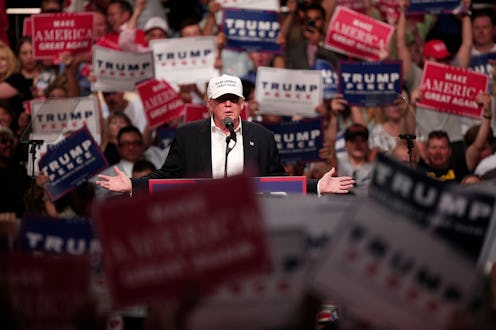News
Donald Trump Will Not Earn Majority Of Black Vote
At a rally in Dimondale, Michigan, Donald Trump attempted to court black voters, and confidently declared that if he gets elected in 2016, he'll have 95 percent of the black vote when he runs for reelection in 2020. It was a curious choice of venue. Census data shows that as of 2010, Dimondale's population was less than one percent black. But that's far from the only reason to doubt Trump's ludicrous prediction.
"At the end of four years, I guarantee you I will get over 95 percent of the African-American vote. I promise you," Trump said. "You're living in poverty, your schools are no good, you have no jobs, 58 percent of your youth is unemployed. What the hell do you have to lose?"
It's a bold claim. It is not, however, a claim with any grounding in objective reality. To be clear, Trump has struggled enormously in selling his candidacy to black Americans. The day before he made his comments in Michigan, for example, a Pew poll was released in which a mere 2 percent of black voters nationally said they'd pull the lever for Trump in November. That's a pretty atrocious showing, and it's not even his worse. In a poll of voters in Ohio, the all-important swing state, Trump got zero percent of black voters' support. There are many more polls that show similar results.
On the one hand, this isn't terribly unusual, because in presidential elections, black Americans overwhelmingly vote for Democrats. Mitt Romney only received 6 percent of the black vote in 2012, for example. Still, that's exponentially higher than Trump's current standing of two percent. Why, then, has Trump failed so spectacularly to woo black voters? It could have something to do with his history of saying racist things about black people. For example, in the 1991 book Trumped! he was quoted as saying that "laziness is a trait in blacks."
"It really is, I believe that," he continued. "It's not anything they can control." Two years earlier, Trump said in an interview with NBC that "a well-educated black has a tremendous advantage over a well-educated white in terms of the job market."
And then, of course, there is the case of the Central Park Five. In 1990, Trump took out a full-page ad implicitly calling for the execution of four black adolescents and one Hispanic boy who'd been accused of raping a woman in Central Park. As it turns out, they were innocent, and after serving years in prison, they reached a $41 million settlement with the city of New York. Instead of apologizing, Trump wrote an op-ed calling the settlement "a disgrace," adding that "these young men do not exactly have the past of angels."
There are many more examples. Trump tweeted out an infographic earlier in this campaign stating that 81 percent of white homicide victims were killed by black people, a patently false claim, and many have pointed to his birtherism as a racially-tinged dog whistle aimed solely at ostracizing America's first black president.
The point is that Trump's standing with black voters is nothing short of toxic, and there are about a million good reasons for that. Trump will not be getting 95 percent of the black vote. Not in 2016, not in 2020, not ever.
